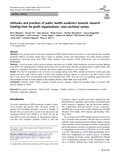| dc.contributor.author | Nakkash, Rima | |
| dc.contributor.author | Ali, Ahmed | |
| dc.contributor.author | Alaouie, Hala | |
| dc.contributor.author | Asmar, Khalil | |
| dc.contributor.author | Hirschhorn, Norbert | |
| dc.contributor.author | Mugharbil, Sanaa | |
| dc.contributor.author | Nuwayhid, Iman | |
| dc.contributor.author | London, Leslie | |
| dc.contributor.author | Saban, Amina | |
| dc.contributor.author | Rashid, Sabina Faiz | |
| dc.contributor.author | Ahmed, Md Koushik | |
| dc.contributor.author | Knai, Cecile | |
| dc.contributor.author | Bigland, Charlotte | |
| dc.contributor.author | Afifi, Rima A. | |
| dc.date.accessioned | 2022-05-17T05:36:45Z | |
| dc.date.available | 2022-05-17T05:36:45Z | |
| dc.date.copyright | 2020 | |
| dc.date.issued | 2020-08-25 | |
| dc.identifier.citation | Nakkash, R., Ali, A., Alaouie, H., Asmar, K., Hirschhorn, N., Mugharbil, S., . . . Afifi, R. A. (2020). Attitudes and practices of public health academics towards research funding from for-profit organizations: Cross-sectional survey. International Journal of Public Health, 65(7), 1133-1145. doi:10.1007/s00038-020-01416-0 | en_US |
| dc.identifier.uri | http://hdl.handle.net/10361/16624 | |
| dc.description | This article was published in the International Journal of Public Health by Springer Link [Copyright © 2020, The Author(s)] and the definite version is available at: https://doi.org/10.1007/s00038-020-01416-0 The Journal's website is at: https://link.springer.com/article/10.1007/s00038-020-01416-0 | en_US |
| dc.description.abstract | Objectives: The growing trend of for-profit organization (FPO)-funded university research is concerning because resultant
potential conflicts of interest might lead to biases in methods, results, and interpretation. For public health academic
programmes, receiving funds from FPOs whose products have negative health implications may be particularly
problematic.
Methods A cross-sectional survey assessed attitudes and practices of public health academics towards accepting funding
from FPOs. The sampling frame included universities in five world regions offering a graduate degree in public health; 166
academics responded. Descriptive, bivariate, and logistic regression analyses were conducted.
Results Over half of respondents were in favour of accepting funding from FPOs; attitudes differed by world region and
gender but not by rank, contract status, % salary offset required, primary identity, or exposure to an ethics course. In the
last 5 years, almost 20% of respondents had received funding from a FPO. Sixty per cent of respondents agreed that there
was potential for bias in seven aspects of the research process, when funds were from FPOs.
Conclusions Globally, public health academics should increase dialogue around the potential harms of research and
practice funded by FPOs. | en_US |
| dc.language.iso | en_US | en_US |
| dc.publisher | Springer Link | en_US |
| dc.relation.uri | https://link.springer.com/article/10.1007/s00038-020-01416-0 | |
| dc.subject | For-profit corporation | en_US |
| dc.subject | Public health | en_US |
| dc.subject | Funding | en_US |
| dc.subject | Conflict of interest | en_US |
| dc.subject | Commercial determinants of health | en_US |
| dc.subject | Unhealthy commodity industries | en_US |
| dc.title | Attitudes and practices of public health academics towards research funding from for-profit organizations: Cross-sectional survey | en_US |
| dc.type | Journal Article | en_US |
| dc.description.version | Published | |
| dc.contributor.department | Brac James P. Grant School of Public Health | |
| dc.identifier.doi | https://doi.org/10.1007/s00038-020-01416-0 | |
| dc.relation.journal | International Journal of Public Health | |

